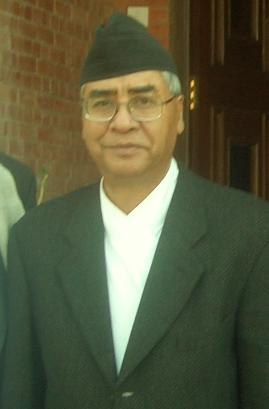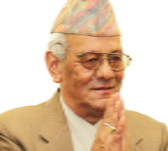
The Nepali Congress is the oldest democratic socialist political party in Nepal and the largest party in the country. The party has 870,106 members as of the party's 14th general convention in December 2021 making them the largest party by membership in Nepal. In June 2023, the party started online membership since the emergence of youth leaders in vital post to bring youths into the party. The party is led by former prime minister, Sher Bahadur Deuba since the party's thirteenth general convention in 2016. The party won 89 seats in the 2022 general election and is currently the largest parliamentary group in the House of Representatives.

The Communist Party of Nepal (Maoist Centre) (Nepali: नेपाल कम्युनिस्ट पार्टी (माओवादी केन्द्र)), abbreviated CPN (Maoist Centre), CPN-Maoist Centre, CPN Maoist Centre, or CPN (MC), is the third largest political party in Nepal and a member party of Samajbadi Morcha. It was founded in 1994 after breaking away from the Communist Party of Nepal (Unity Centre). The party launched an armed struggle in 1996 against the Nepalese government. In 2006, the party formally joined mainstream politics after signing a peace agreement following the 2006 Nepalese revolution.

The Communist Party of Nepal (Unified Marxist–Leninist) (Nepali: नेपाल कम्युनिष्ट पार्टी (एकीकृत मार्क्सवादी-लेनिनवादी), romanized: nēpāl kamyuniṣṭ pārṭī (ēkīkṛt mārksavādī-lēninavādī); abbr. CPN (UML)) is a communist political party in Nepal. The party emerged as one of the major parties in Nepal after the end of the Panchayat era.

Sher Bahadur Deuba is a Nepali politician and former prime minister of Nepal. He has also been serving as the president of the Nepali Congress since 2016. Deuba has served five terms as prime minister and is the Member of Parliament for the parliamentary constituency of Dadeldhura 1.

Nepal Ratna Girija Prasad Koirala, affectionately known as Girija Babu, was a Nepalese politician. He headed the Nepali Congress and served as the Prime Minister of Nepal on four occasions, including from 1991 to 1994, 1998 to 1999, 2000 to 2001, and 2006 to 2008. He was the Acting Head of State of Nepal between January 2007 and July 2008 as the country transitioned from a monarchy to a republic.

Bishweshwar Prasad Koirala, better known as B. P. Koirala, was a Nepali revolutionary, political leader, and writer. He was the Prime Minister of Nepal from 1959 to 1960. He led the Nepali Congress, a social democratic political party. He was the grandfather of Bollywood actors Manisha Koirala and Siddharth Koirala, the elder brother of former prime minister Girija Prasad Koirala and the younger brother of former prime minister Matrika Prasad Koirala.

The 2006 Democracy Movement is a name given to the political agitations against the direct rule of King Gyanendra of Nepal. The movement is also sometimes referred to as Jana Andolan II, implying it being a second phase of the 1990 revolution, also known as the Jana Andolan.
Sushil Prasad Koirala was a Nepalese politician and the Prime Minister of Nepal from 11 February 2014 to 10 October 2015. He was also President of the Nepali Congress from 2010 to 2016, having earlier served in various capacities in the party.
The first Girija Prasad Koirala cabinet was formed on 26 May 1991 when Girija Prasad Koirala was appointed as prime minister by King Birendra following the 1991 election. The council of ministers was recommended by Koirala and were appointed on 29 May 1991. The cabinet was expanded with the appointment of two state ministers on 5 May 1991.

The first Sher Bahadur Deuba cabinet was formed on 12 September 1995. After Man Mohan Adhikari lost support in the House of Representatives, he recommended to dissolve the lower house. However, the Supreme Court restored the lower house and King Birendra appointed Nepali Congress parliamentary party leader Sher Bahadur Deuba as prime minister on 11 September 1995. He was supported by the Rastriya Prajatantra Party and Nepal Sadbhawana Party.

The Chand–Gautam coalition was formed on 12 March 1997, after the biggest party in the House of Representatives, CPN (UML) supported Rastriya Prajatantra Party leader Lokendra Bahadur Chand as the prime minister. The cabinet was expanded on 25 March 1997, 30 June 1997 and 29 August 1997.
The fourth Surya Bahadur Thapa cabinet was formed on 7 October 1997. Surya Bahadur Thapa of the Rastriya Prajatantra Party was appointed as the prime minister by King Birendra after he was supported by Nepali Congress, Nepal Sadbhawana Party and some independents. The cabinet was expanded on 27 October 1997 and was reshuffled on 3 December 1997.
The second Girija Prasad Koirala cabinet was formed on 15 April 1998 after the appointment of Nepali Congress leader Girija Prasad Koirala as prime minister by King Birendra. Girja was supported by CPN (Marxist–Leninist). The cabinet was expanded on 21 April 1998. On 26 August 1998, the cabinet was reshuffled and ministers from CPN (Marxist–Leninist) where included. After CPN (Marxist–Leninist) withdrew their support for the government on 11 December 1998, Girija resigned as prime minister ten days later.

The Krishna Prasad Bhattarai cabinet was formed on 31 May 1999 after Nepali Congress leader Krishna Prasad Bhattarai was appointed as the prime minister by King Birendra following the 1999 election. The cabinet was reshuffled on 30 June 1999.
The fourth Girija Prasad Koirala cabinet was formed on 21 March 2000 after Nepali Congress leader Girija Prasad Koirala was appointed as the prime minister by King Birendra. After the His Majesty's Government Regulations 2000 came into effect on 18 April 2000, the cabinet was reformed. The cabinet was reshuffled on 7 February 2001.
The second Deuba cabinet was formed on 26 July 2001 after Nepali Congress leader Sher Bahadur Deuba was appointed as prime minister by King Gyanendra. The cabinet was expanded on 18 October 2001.
The fifth Surya Bahadur Thapa cabinet was formed on 11 June 2003 after King Gyanendra appointed Surya Bahadur Thapa as prime minister. The ministers were assigned extra portfolios on 1 August 2003.
The third Deuba cabinet of Nepal was formed on 10 June 2004 after the appointment of Sher Bahadur Deuba as prime minister by King Gyanendra. The cabinet was expanded on 5 July 2004 with the inclusion of CPN (UML), Rastriya Prajatantra Party and Nepal Sadbhawana Party.
The Girija Prasad Koirala interim cabinet was formed on 1 April 2007. The interim cabinet was formed as a national unity government which included the former Maoist rebels.











